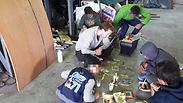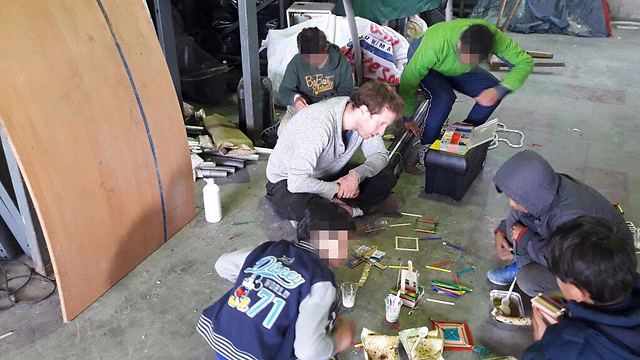
Israel’s humanitarian aid to victims of the Syrian Civil War has been well documented. Dozens of Syrian combatants and civilians have been treated at Ziv Medical Center in Safed, and a rash of Israeli relief organizations have conducted fund raising drives to ensure that refugees have sufficient food, clothes, medical supplies and more.
This time, however, the group’s mission was far bolder, an unprecedented initiative aimed at opening a pedagogical center for refugee children so long estranged from the educational framework. Even more, the uniqueness of the project also shone through the mutual cooperation of its initiators.
The school, an initiative of Hashomer Hatzair, a Zionist-Socialist youth movement founded over eight decades ago to spearhead the establishment of kibbutzim and other pioneering efforts in pre-state Palestine, was the brainchild of Noah Leibel, the movement’s coordinator for educational activities in development towns, poor neighborhoods, Arab villages and other deprived areas.
“While watching media coverage of the civil war, I started thinking what I could do to provide meaningful help to the victims,” Leibel, 32, told TPS. “Then it hit me: What those kids needed more than anything was an educational framework, so they could at least continue with their education, and not end up as a lost generation.”
To discuss the idea of creating a school, Leibel approached Hagai Mayork, head of the Hashomer Hatzair graduates division. Together, they contacted Renin Kahil, international projects coordinator for Ajyal, Hashomer Hatzair’s Arab affiliate. “They are our natural partners for such a venture,” Leibel said.
Kahil agreed immediately to work together. “We had no qualms whatsoever, we realized straight away this is a project worth doing, and immediately agreed to cooperate fully,” Kahil told TPS.
The sister movements set up a joint task force to begin planning the project. They contacted Natan, a large Israeli NGO with logistics experience and a network of international contacts.
“Natan connected us with a major Swiss humanitarian organization that was already operating intensively in refugee camps in Greece for years and successfully established a community center in Thessaloniki. The association was well versed in how to navigate the relevant bureaucracies and regulatory agencies,” said Noah Leibel.
Within a few months, the dream started turning into reality. Dozens of educators, social workers, and counselors donated time, energy and knowledge while Hashomer Hatzair students embarked on an ambitious fund raising drive, raising over NIS 240,000 in a relatively short time. “This was enough to allow us to move forward,” Leibel said.
Noah’s brother Yair, 28, also joined the project, taking responsibility for field operations. “We got dozens of offers from people from all walks of Israeli life, people who were willing to help turn our dream into reality,” he said.
The Israeli project coordinators say they understand they may have to tread carefully among the refugee population so as not to arouse any antagonism, but also added that they have yet to encounter any major problems. They said they do not hide the fact they are Israelis, but they also do not flaunt it needlessly.
“(We behave) with sensitivity, tact and common sense. So far, it’s worked,” said Yair Leibel to TPS.
To ensure optimal cost-effectiveness, the school programs adhere to guidelines mandated by the UN High Commissioner for Refugees. The core syllabus includes English, mathematics, history, and non-academic activities such as arts and sports.
Plans call for the school to accommodate approximately 500 students. Although almost all the refugees are Sunni Muslims, the student body is diverse, in terms of age, previous levels of schooling and levels of religious observance. Some refugees, especially those hailing from relatively small towns and villages, tend to be very conservative and traditional, while others, especially those who lived in large cities, are more secular.
“We have been here for two months, and as we become part of the local landscape, the fact that we are from Israel becomes less of an issue,” Yusuf Kabha, Ajyal’s 43-year old director (and resident of the northern Israeli Arab town of Ein as-Sahla), told TPS by phone from Greece.
The two organizations hope to be able to send out more groups of volunteers in the future. Each group would be composed of 6 participants, all of whom speak Hebrew and either English or Arabic. Additionally, they also aim to bring a group of professional social workers who can help the kids and their families deal with the trauma they have experienced, and maintain their emotional and mental health and well-being.
“I believe in people and their capacity for good,” said Leibel. “The fantastic response we have gotten, and the number of people willing to voluntarily donate their time, skills and knowledge to this project has been overwhelming. It proves that Jews and Arabs can work together, can achieve great things, in this case materially helping Syrian refugees who had the bad luck to be the victims of a cruel and vicious civil war.”
Reprinted with permission from TPS.

















